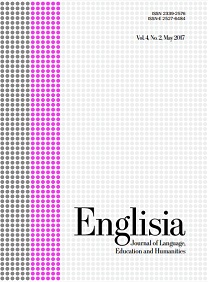Self-efficacy beliefs of English teachers from a non-educational background in the Indonesian context
DOI:
https://doi.org/10.22373/ej.v10i1.12935Keywords:
TPACK self-efficacyAbstract
This research investigates how English teachers with a non-English educational background demonstrate their self-efficacy beliefs on the technological pedagogical content knowledge (TPACK) toward their professional practices. The data was obtained from 18 teachers from a non-English educational background in formal and informal Indonesian education settings. Those teachers undertook strategies to develop the technological pedagogical content knowledge (TPACK) while managing their self-efficacy beliefs. Employing a mixed-method research approach, this study gathered the data using closed-ended and open-ended questionnaires, individual interviews, and in-depth interviews. Responses revealed that 18 participants completed a 5-item Likert-type survey measuring the level of teachers’ TPACK self-efficacy. The survey measures the three major aspects of TPACK mean value for teachers’ technological knowledge (TK) (X ̅=23.55) and pedagogical knowledge (PK) (X ̅=19.55), both of which are relatively higher than the value of the content knowledge (CK) (X ̅=16). The dominant factor affecting the high percentage in those two aspects emanates from the teachers’ persistent accounts that they need to be independent in learning while constantly updating their knowledge. This research also discusses the suggestion for future research studies for developing teachers’ TPACK self-efficacy.Downloads
References
Creswell, J. W. (2013). Qualitative inquiry and research design: Choosing among five approaches (3rd ed.). Thousand Oaks, CA: Sage. Family Online Safety Insitute.
Dunst, C. J., & Bruder, M. B. (2014). Preservice professional preparation and teachers’ self-efficacy appraisals of natural environment and inclusion practices. Teacher Education and Special Education, 37(2), 121-132.
Hashweh, M. Z. (2013). Chapter 6 pedagogical content knowledge: twenty-five years later. In C. J. Craig, P. C. Meijer, & J. Broeckmans (Eds.), From Teacher Thinking to Teachers and Teaching: The Evolution of a Research Community (Pp. 115–140)., Bingley, England: Emerald Group Pub. Ltd.
J. A. Choi and S. Kwon. (2015). Analysis of the structural equation model on self-concept in such, the perception and the actual understanding of musical contents knowledge, and music teaching efficacy of early childhood pre-service teachers. Journal of Future Early Childhood Education, Vol.22, No.4, Pp.257-278.
Kim, E. (2013). Music technology-mediated teaching and learning approach for music education: A case study from an elementary school in South Korea. International Journal of Music Education, 31(4), 413-427.
Kultsum, U. (2017). The Concept of Pedagogical Content Knowledge (PCK): Recognizing the English Teachers’ Competences in Indonesia. https://doi.org/10.2991/icirad-17.2017.11
McNicholl, J., Childs, A., & Burn, K. (2013). School subject departments as sites for science teachers learning pedagogical content knowledge. Teacher Development, 1–20.
Nagauleng, A. M. (2018). Investigasi Terhadap Kompetensi Dosen Non Bahasa Inggris Dalam Mengajarkan Bahasa Inggris: Studi Kasus Di Uin Alauddin Makassar. (Doctoral Dissertation; Pascasarjana).
Naz, M., Scholar, M. P., & Scholar, M. P. (2020). Self-Efficacy Beliefs of Pre-Service Teachers Regarding Online Teaching. VI(I).
Nespor, J. (1987). The role of beliefs in the practice of teaching. Journal of Curriculum Studies, 19(4), 317-328.
Pajares MF. (1992). Teachers’ Beliefs and Educational Research: Cleaning Up a Messy Construct. Review of Educational Research, 62(3), 307–332. Https://Doi.Org/10.3102/00346543062003307.
Rodrigues, S., Marks, A., & Steel, P. (2003). Developing science and ICT pedagogical content knowledge: A model of continuing professional Innovations. Education and Teaching International, 40(4), 386–394.
Rubashini Ramakrishnan, Norshidah Mohamad Salleh, & Aliza Alias. (2019). Technological pedagogical and content knowledge among vocational special education teachers. 4, 144–149.
S. Garvis and D. Pendergast. (2011). An investigation of early childhood teacher self-efficacy beliefs in the teaching of arts education. International Journal of Education and the Arts, Vol.12, No.9, Pp.1-15.
Sensoy, O., & Yildirim, H. I. (2018). Impact of Technological Pedagogical Content Knowledge Based Education Applications on Prospective Teachers’ Self-Efficacy Belief Levels Toward Science Education. Journal of Education and Training Studies, 6(10), 29.
https://doi.org/10.11114/jets.v6i10.3433
Shulman, L. S. (1987). Knowledge and teaching: Foundations of the new reform. Harvard Educational Review. Harvard Educational Review, 57(1), 1–23. http://people.ucsc.edu/~ktellez/shulman.pdf
Shulman, Lee S. (1986). Those Who Understand: A Conception of Teacher Knowledge. American Educator, 10(1), 4–14. http://www.eric.ed.gov/ERICWebPortal/recordDetail?accno=EJ333816%5Cnpapers3://publication/uuid/E77F7FFC-98B3-40B5-90D2-50050B024672
Van Dijk, E. M., & Kattmann, U. (2007). A research model for the study of science teachers’ PCK and improving teacher education. Teaching and Teacher Education, 23(6), 885-897.
Von Frank, V. (2008). Professional Learning for School Leaders. Oxford, Ohio: National Staff Development Council.
Zhu, X., & Wang, Y. (2020). Developing Pedagogical Content Knowledge for Pre-service Teachers Learning to Teach English as a Foreign Language. Frontiers in Educational Research, 3(9).
Downloads
Published
Issue
Section
License
Proposed Policy for Journals That Offer Open Access
Authors who publish with Englisia journal agree to the following terms:
- Authors retain copyright and grant the journal right of first publication with the work simultaneously licensed under a Creative Commons Attribution License that allows others to share the work with an acknowledgement of the work's authorship and initial publication in this journal.
- Authors are able to enter into separate, additional contractual arrangements for the non-exclusive distribution of the journal's published version of the work (e.g., post it to an institutional repository or publish it in a book), with an acknowledgement of its initial publication in this journal.
- Authors are permitted and encouraged to post their work online (e.g., in institutional repositories or on their website) prior to and during the submission process, as it can lead to productive exchanges, as well as earlier and greater citation of published work (See The Effect of Open Access).









